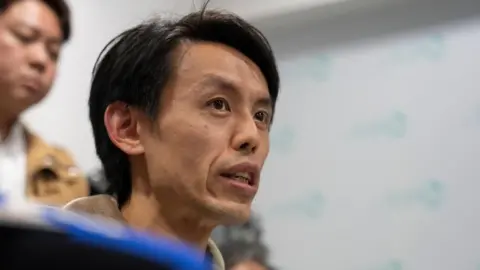Martin Yip
BBC Chinese
Reporting fromHong Kong
Tessa Wong
BBC News
Reporting fromSingapore

 EPA
EPA
Party chairman Lo Kin-hei addressed reporters at a late night press conference on Tuesday
The leaders of Hong Kong's Democratic Party have announced plans to dissolve what was once the city's largest opposition group.
Members will soon vote on the final decision on whether to shut down the 31-year-old party, chairman Lo Kin-hei said.
The party has been struggling to survive following moves by China to crack down on dissent in the city in the wake of the 2019 protests.
Beijing and Hong Kong's government have argued that such moves were necessary for national security.
As part of the crackdown, Beijing overhauled the former British colony's polling systems.
The so-called "patriots law" was passed in Hong Kong in 2021 that ensured only people regarded as loyal to the Communist regime in Beijing could serve as lawmakers or local councillors in the semi-autonomous territory.
This law effectively barred the Democratic Party from taking part in elections.
At a late-night press conference on Tuesday after a party meeting, Mr Lo said the party's leaders had made the call to wind down based on the "current political situation".
"Developing democracy in Hong Kong is always difficult, and it's especially difficult in the past few years," Mr Lo said to reporters.
He did not comment when asked if the party's leaders' decision had been made under political pressure.
The party has set up a work group for the shutdown process. At least 75% of its members attending an upcoming general meeting will have to approve the move before it is final. A date for that meeting is yet to be set.
On Wednesday, Hong Kong government adviser Regina Ip accused the Democratic Party of pursuing an agenda that opposed China and "constantly causing trouble inside and outside parliament".
"Therefore I am not surprised at all that they have been losing supporters in recent years... the Democratic Party has already reached a dead end," said Ms Ip, co-convener of Hong Kong's cabinet-like Executive Council.
The Democratic Party was notable for having rare direct negotiations with the Liaison Office - the Chinese Communist government's representation in Hong Kong - in 2010, to discuss plans for more liberal elections.
Its younger members, however, saw those negotiations as a betrayal. The move triggered a split while the party lost support.
It subsequently regained strength and became the most successful opposition political force in the city after acquiring the most seats in the 2019 local council elections, which took place during the violent anti-government protests.
A number of the Democratic Party's members - including prominent pro-democracy figures Helena Wong, Lam Cheuk-ting, Wu Chi-wai and Albert Ho - are among the Hong Kong 47 group of campaigners jailed under the controversial national security law.
Another member, former legislator Ted Hui, is now living in Australia in exile and is wanted by the Hong Kong government for alleged national security offences. Earlier this week a court issued an order to confiscate his assets and money in Hong Kong, which are held by his family and a law firm.
In December, Hong Kong stripped the honorary Justice of the Peace title from Martin Lee KC, a key founder of the Democratic Party, after the veteran barrister lost his appeal against an unauthorised assembly conviction.

 22 hours ago
3
22 hours ago
3









